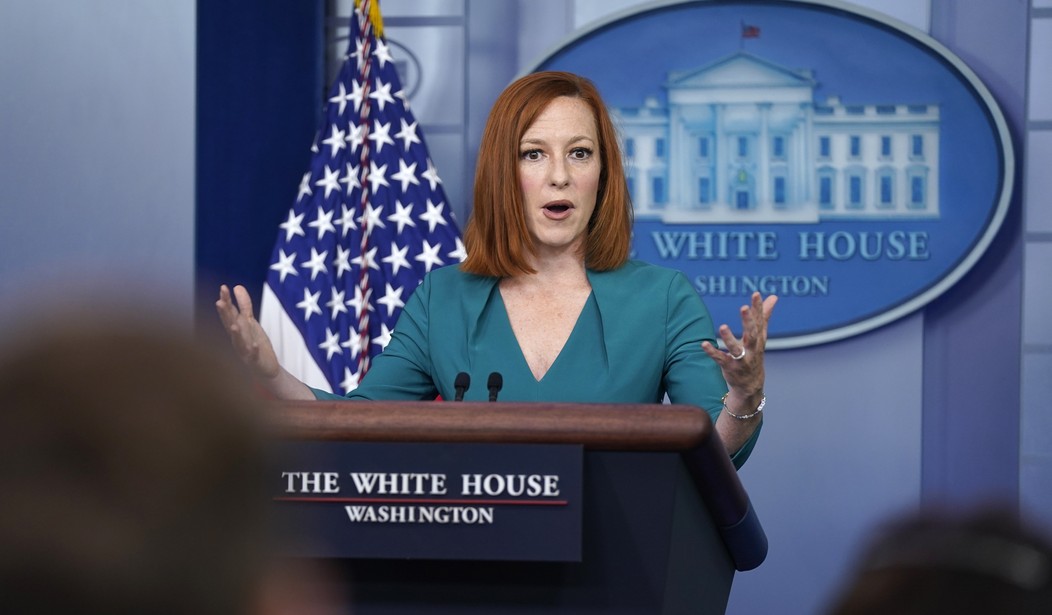The crux rests with what is declared misinformation, and by which entities.
On Friday, revelations were reported that the Biden administration — after a renewed look into the origins of Covid-19 — has stated there is a likelihood the virus may have emerged from a research lab that is just as plausible as the nature-origin plotline. This is yet another example of the theory becoming a possibility, one that has previously been dismissed. The announcement represents the significant shift in this narrative that began last year, with officials and the media becoming open to the possibility of a man-made emergence of this virus.
What makes this all the more significant is the recent comments made by Press Secretary Jen Psaki about the efforts of the Biden administration regarding a related issue with vaccine information. There was quite the furor created when Psaki spoke of the White House wanting to work with Facebook and target specific social media accounts they deem to be delivering dangerous posts regarding vaccines. They want Facebook to de-platform those accounts spreading claimed misinformation, and also they want these accounts taken down from other platforms.
This is a chilling step, to see our leadership pushing to literally censor individuals, but it is made all the more worse by the administration’s own announcement that same day. The reason: what the administration stated Friday is in direct opposition to what was being said last year on the very same topic. When the prospect of a released virus was being voiced last year by members of Congress and President Trump, it was roundly contradicted by health officials and a majority of media outlets. The Wuhan lab leak theory was, at the time, dubbed as “misinformation.”
If the new desired standard of silencing accounts decreed by higher voices to be delivering inaccurate information had been in place last year, this topic — now announced as being plausible — could have been grounds to have targets denied their free expression. This means they could have shut down accounts for spreading false information that was declared false while ultimately becoming accurate. And the danger of this is exposed by the very fact that this is hardly the lone example from the past year.
This week, Johns Hopkins University issued a report on the alarming rise in deaths by overdose that occurred in 2020. It is a serious issue, and it was one being mentioned last year, out of concern what the extended lockdowns and subsequent unemployment could lead to regarding drug use. It is also another issue that was being dismissed as misinformation, as this Washington Post example shows.
This week Johns Hopkins expressed dismay over a sharp rise in overdoses during the pandemic.
Also this week, many question how they, and journalists, act surprised. This was voiced last year but the press tossed it aside, since it came from the President.https://t.co/2SLSQ14X6q— Brad Slager – In Trouble More Than Pres. Biden (@MartiniShark) July 16, 2021
This shows an emerging pattern from 2020 to today, where numerous items that derived from President Trump were dismissed outright and declared “misinformation,” only to be found to have credence and/or relevance. The Lafayette Park tear gas incident that wasn’t is but another example. Numerous items regarding the pandemic, from Hydroxychloroquine to the possibility of a vaccine by year’s end, were said to be dangerous examples of false information. When the Russian bounty story was being circulated, the Washington Post declared Trump lying when he described that story as a hoax. That the story has unraveled faster than a sweater knitted by a one-armed methadone addict is now history.
Then there is the Hunter Biden laptop fiasco. News outlets not only questioned the veracity of the story, some flat out refused to even look into it, claiming it was sourced by Russian disinformation agents. That the story has been proven true is now known, and the claim of Russian involvement was what had been the true misinformation, and yet we saw exactly what this could all lead to with this new push by the administration — the New York Post saw its social media accounts squelched over their story that was factually accurate.
This is precisely what the new push by the administration to silence sources can lead to. In her comments on Friday Jen Psaki declared, “We’re flagging problematic posts for Facebook that spread disinformation.” The key word there is “problematic,” which is significantly different from “inaccurate.” This tips their hand, as they intend to go after posts that interfere with their agenda and possibly disrupt their spin and sales technique on certain issues.
Accuracy is not the issue, as we have seen over the past year — it is maintaining the narrative and pushing their policies without interruption of facts. Also seen this past year, the press is more than willing to play along with their directives. Just note the lack of outrage over these comments by the administration. In fact, many in the press are in agreement that they should engage with these practices.
Wow. Remarkable statement. So much tension between White House and Facebook right now. Heard from a source that WH incredibly frustrated after months of asking FB for data on vaccine misinfo that company, despite saying in public they want to work with WH, isn't sharing https://t.co/Pp7frsOwDP
— Cecilia Kang (@ceciliakang) July 16, 2021














Join the conversation as a VIP Member